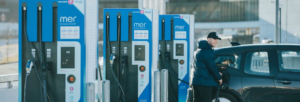Recent reports backed by thorough analysis and data suggest that pure electric vehicles (EVs) are set to outnumber gasoline-powered cars on Norwegian roads by the end of this year or early 2025. This shift would mark the first time that electric cars have surpassed gasoline cars in any country.

Current Vehicle Statistics in Norway
As per the Norwegian Public Roads Administration’s latest data, out of 2.9 million total cars registered in Norway as of March 15 this year, 24.3% are pure electric, while 26.9% are gasoline-powered. This indicates a gap of nearly 76,000 more gasoline cars than electric. However, with last year’s sales of pure electric cars reaching 104,590, this gap is quickly closing.
Predictions from Experts
Robbie Andrew, a senior researcher at the climate change think tank CICERO, predicts significant changes in the near future. “If the current trend continues over the next 12 months, and considering the negligible sales of pure gasoline cars now, we could see only 100,000 pure gasoline cars remaining on the road by next year. Electric vehicles are likely to surpass gasoline cars by the end of this year,” Andrew stated.

Market Trends and Government Incentives
Norway has been encouraging the shift to electric vehicles through substantial government incentives. Despite a general downturn in new car sales last year due to rising interest rates and reduced tax incentives, electric vehicles maintained a dominant share. According to the Norwegian Road Federation (OFV), electric vehicles made up a record 92.1% of all new car sales in January, and 89.3% in March.
Long-Term Goals
The Nordic nation, with a population of 5.5 million, is aiming to cease the sale of new petrol and diesel cars altogether by 2025. However, it is expected to take several more years for electric vehicles to surpass diesel vehicles in number, despite the current progress with gasoline vehicles. This transition highlights Norway’s leading role in the global movement towards sustainable transportation, supported by proactive government policies and consumer acceptance of electric technology.

